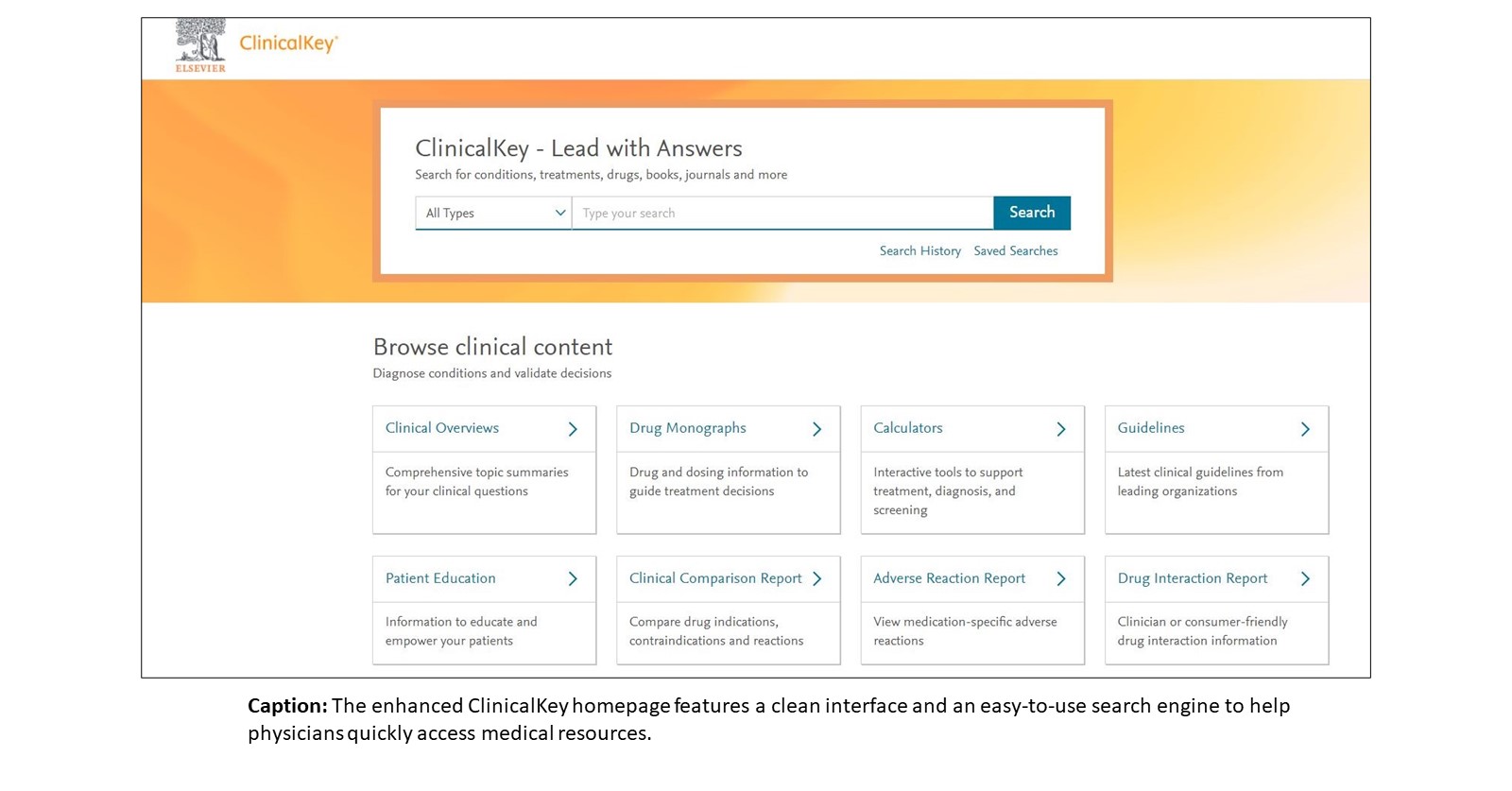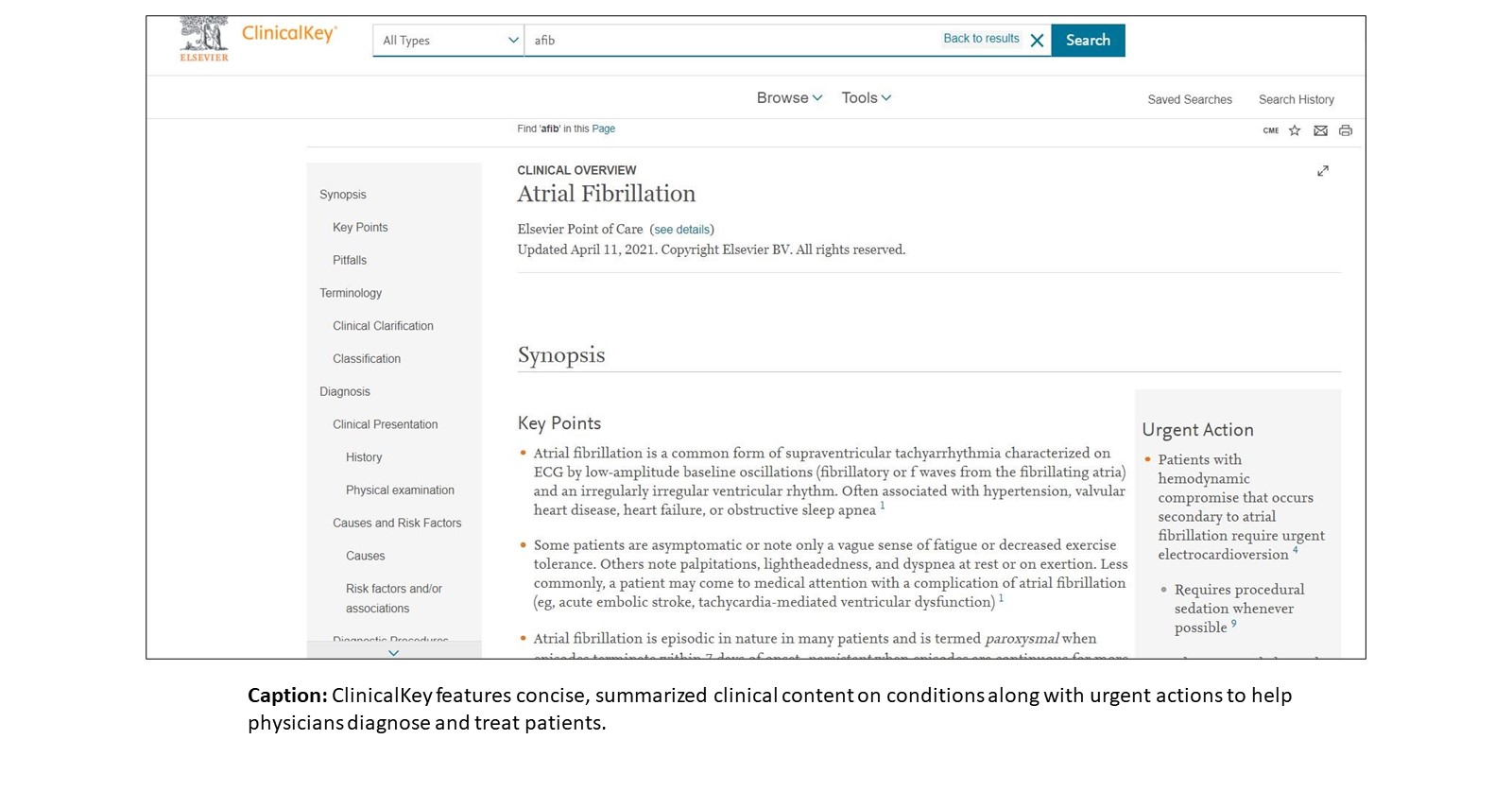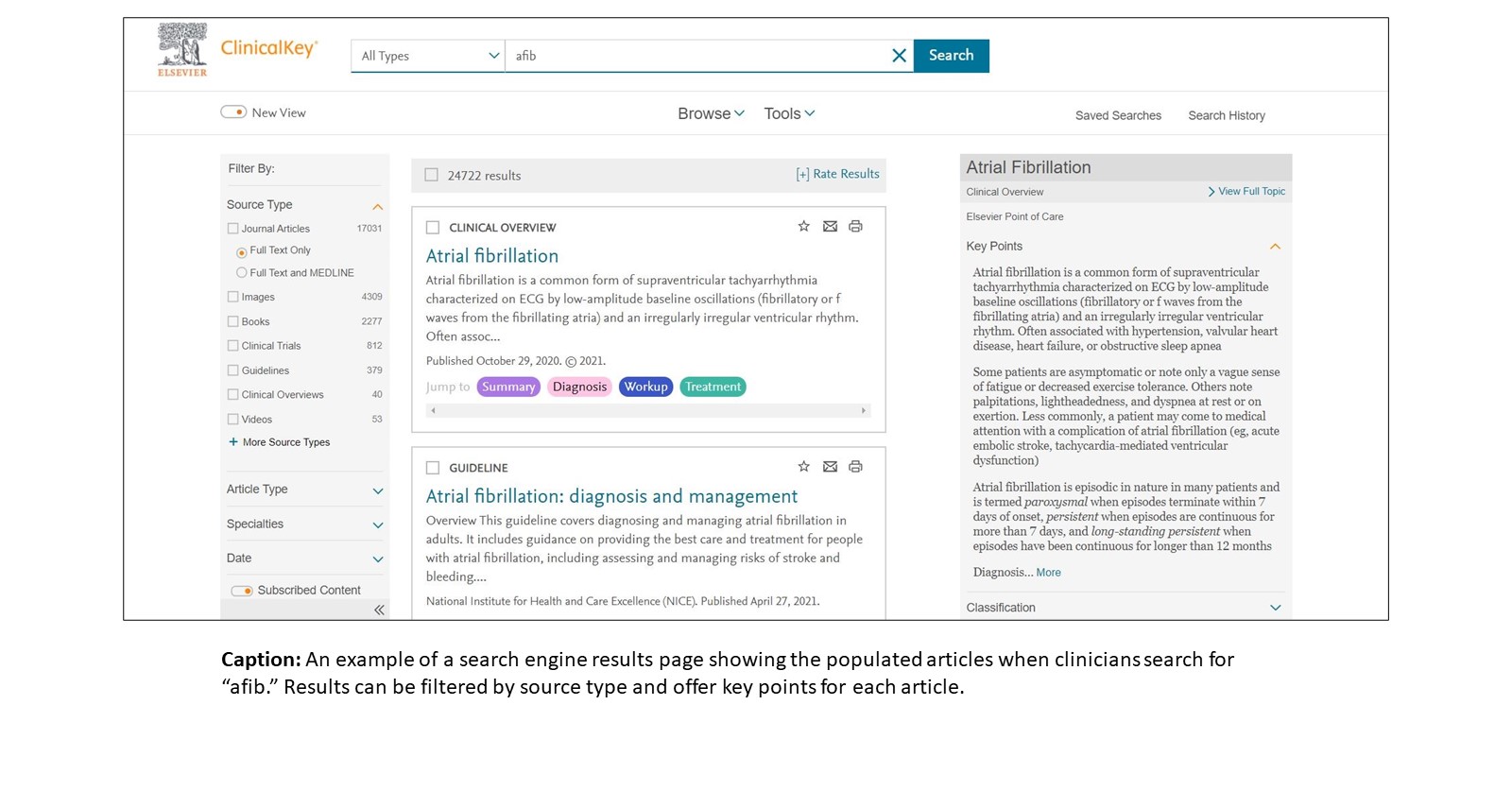
Elsevier Launches Advanced Clinical Tool To Bring World-Class Medical Content to Physicians Globally at the Point of Care
NEW YORK, USA / AGILITYPR.NEWS / August 16, 2021 / Advanced digital solution ClinicalKey® addresses clinician feedback on the demand for quick, evidence-based clinical information when they need it
Elsevier, a global leader in research publishing and information analytics, is pleased to announce the launch of an enhanced version of ClinicalKey®, which will provide physicians with quick access to Elsevier’s trusted medical resources in addition to clinical decision support at the point of care. The new ClinicalKey for physicians in the U.S. and various international markets will help them diagnose and treat patients faster, and more effectively, based on the latest evidence.
This enhancement is coming as time-pressed clinicians are facing the daunting task of having to keep current with a high volume of medical research output. The rate at which medical knowledge has been expanding in recent history is exponential. In 1950, the total amount of medical research doubled in approximately 50 years. This accelerated to 7 years in 1980; 3.5 years in 2010; and just 73 days in 20201. Recognizing this issue, Elsevier conducted extensive research with hundreds of clinicians and leveraged global insights to inform the development of a solution that would support them with patient care in an environment where evidence-based data and guidance changes quickly. Elsevier also partnered with institutional leaders to evolve ClinicalKey and help address these challenges.
Dr. Romil Chadha, MD, MPH, FHM, FACP, Assistant Chief of Operations, Division of Hospital Medicine, UK Health Care, who collaborated with Elsevier to help develop the next version of ClinicalKey, said: “As a practicing physician, and leader of a team of hospital clinicians, I have seen first-hand the realities of information overload for healthcare professionals and the challenges it presents. There is a strong need in the healthcare industry for a single solution that enables clinicians to make fast decisions at the point of care with confidence, because they are based on the latest evidence. I was honored to work with Elsevier to redesign ClinicalKey to help meet this need.”2

While ClinicalKey will retain all current elements and functionality as a reference resource, it now includes new features that make it easier to use for clinical decision support, such as:
- New user interface: The cleaner interface leverages existing clinical workflows to naturally align with each user’s thought process to improve content discovery. Represented by a system of colors and icons, each page includes a clear visual hierarchy of factors such as importance, relevance, and recurrence, to help clinicians in their process of finding an answer to their question.
- Improved search functionality: The new search interface supports clinicians by getting them the information they need in the moment they need it. A powerful algorithm instantly provides the most relevant and comprehensive content, while also allowing the ability to quickly drill down to precise pieces of information.
- Significant Point of Care content: Clinicians have quick access to both in-depth research materials and concise, summarized content. The dynamic linkage between the content types promotes an easy and fast experience when diagnosing a patient or creating a treatment plan, without having to repeat a search query. The ability to access high-level content that is based on volumes of evidence-based research, is helping clinicians save precious time in emergency situations that require quick and confident decisions for patient care.
Jan Herzhoff, President, Health, Elsevier said: “The responsibilities of clinicians today are becoming increasingly complex with more and more patients presenting with comorbid, chronic conditions that can be difficult to manage, especially in today’s fast paced, demanding healthcare environment. This next generation of ClinicalKey is deeply rooted in learnings that we made with our partners from across the globe, combined with the latest design thinking. It supports every moment in the healthcare continuum with trusted, evidence-based answers, from quick point-of-care answers to deep clinical research through one single search.”


Elsevier has been working continuously to enhance its global portfolio of clinical solutions, making these tools more responsive and accessible at the point of care.
During the process of building and enhancing ClinicalKey, local solutions in specific international regions have also been developed. These include ClinicalKey China, and ClinicalKey Now, a solution that responds to needs in key local markets outside of the U.S., so that they can have confidence in their decisions to sustain continuity of care for patients. Other products in Elsevier’s portfolio include ClinicalPath, an evidence-based oncology pathways embedded in the clinical workflow to allow oncology practices to predict, measure and manage treatment decisions and costs, and Elsevier Clinical Nursing which combines trusted evidence and technology to empower nurses to excel.
To learn more about ClinicalKey and the unique experience it provides users, please visit its website.
Notes:
1 Densen P. “Challenges and opportunities facing medical education”. Trans Am Clin Climatol Assoc. 2011;122:48-58. Available at: https://www.ncbi.nlm.nih.gov/pmc/articles/PMC3116346/
2 Dr. Romil Chadha’s quote represents the opinions of the author and not that of the University of Kentucky or UK HealthCare.
About Us
Elsevier
As a global leader in information and analytics, Elsevier helps researchers and healthcare professionals advance science and improve health outcomes for the benefit of society. We do this by facilitating insights and critical decision-making for customers across the global research and health ecosystems.
In everything we publish, we uphold the highest standards of quality and integrity. We bring that same rigor to our information analytics solutions for researchers, health professionals, institutions and funders.
Elsevier employs 8,100 people worldwide. We have supported the work of our research and health partners for more than 140 years. Growing from our roots in publishing, we offer knowledge and valuable analytics that help our users make breakthroughs and drive societal progress. Digital solutions such as ScienceDirect, Scopus, SciVal, ClinicalKey and Sherpath support strategic research management, R&D performance, clinical decision support, and health education. Researchers and healthcare professionals rely on our 2,500+ digitized journals, including The Lancet and Cell; our 40,000 eBook titles; and our iconic reference works, such as Gray's Anatomy. With the Elsevier Foundation and our external Inclusion & Diversity Advisory Board, we work in partnership with diverse stakeholders to advance inclusion and diversity in science, research and healthcare in developing countries and around the world.
Elsevier is part of RELX, a global provider of information-based analytics and decision tools for professional and business customers. www.elsevier.com
Contacts
Teresa Mueller
Vice President, Global Health Markets
t.mueller@elsevier.comElsevier Communications
Phone: +31 6 20987384